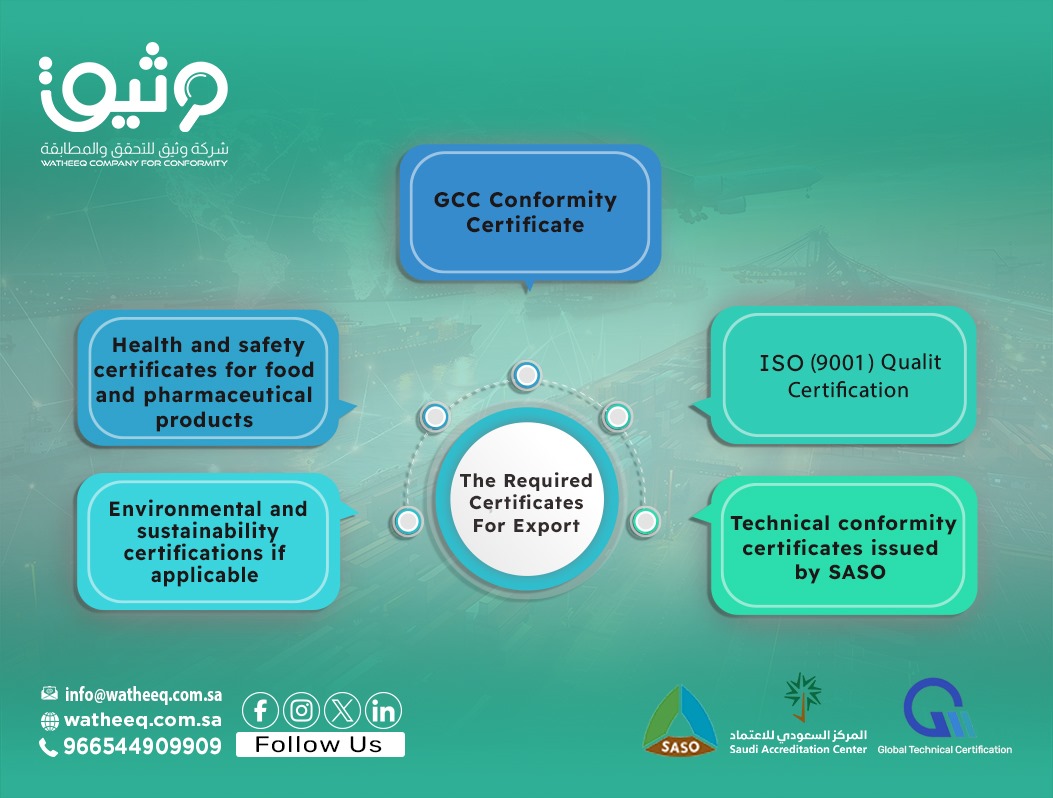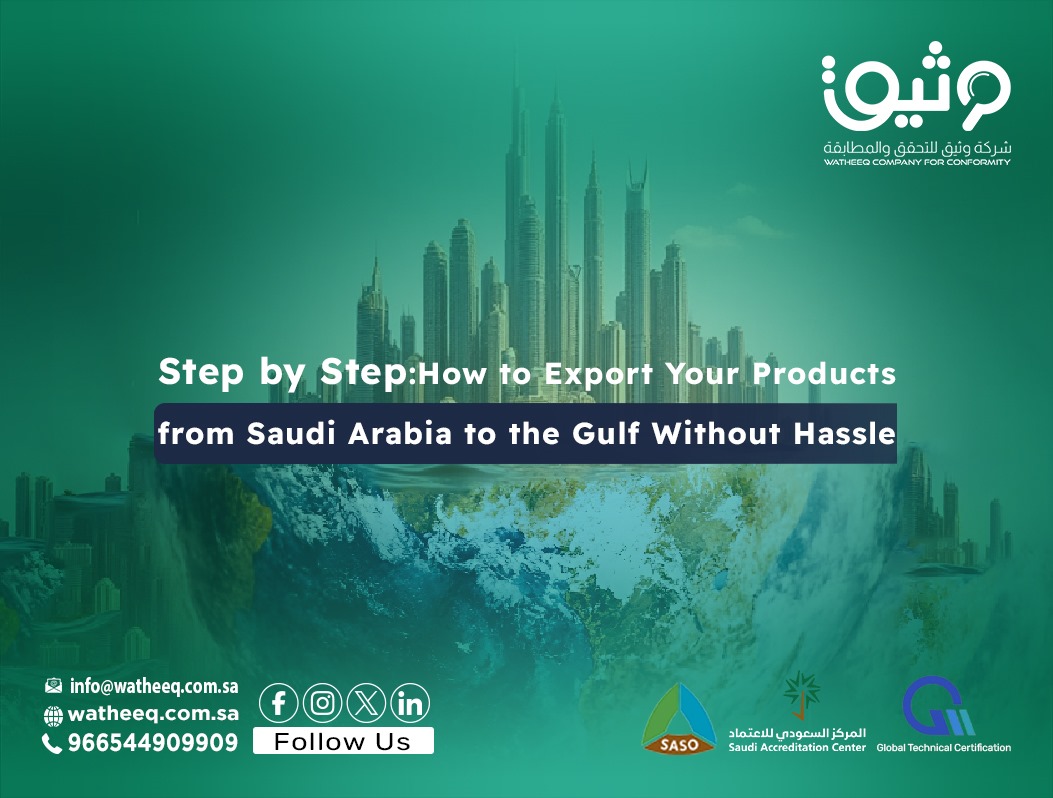Learn about the conditions for exporting Saudi products to Gulf countries, how to obtain conformity and quality certificates via "Saber" and "Watheeq," in addition to customs clearance procedures and tips to ensure successful exports.
Article Contents:
- The Importance of Exporting to Gulf Countries for Saudi Investors
- Conditions and Requirements for Exporting Saudi Products to the Gulf
- The Role of Conformity and Accreditation Certificates in Facilitating Exports
- What Are the Key Conformity Certificates Required for Export?
- Steps to Obtain Conformity and Quality Certificates for Saudi Products
- The Role of the "Saber" Platform in Product Certification
- How "Watheeq" Assists in Issuing Conformity and Accreditation Certificates
- Customs Clearance and Shipping Procedures for Gulf Countries
- Challenges Faced by Saudi Exporters and How to Overcome Them
- Tips to Ensure a Successful Export Process to the Gulf
1. The Importance of Exporting to Gulf Countries for Saudi Investors
Exporting to Gulf countries presents significant opportunities for Saudi investors to expand their businesses and increase profits. The Gulf region offers a large consumer market due to economic and cultural similarities with Saudi Arabia. Moreover, Gulf trade agreements facilitate the movement of goods and promote inter-Gulf trade.
2. Conditions and Requirements for Exporting Saudi Products to the Gulf
To ensure successful export operations from Saudi Arabia, several conditions must be met:
- Possessing a valid commercial registration that includes export activities.
- Obtaining conformity and accreditation certificates to guarantee product quality.
- Registering on the "Saber" electronic platform for product approval.
- Meeting Saudi and Gulf customs requirements.
- Contracting with certified shipping companies to ensure safe delivery of products.
3. The Role of Conformity and Accreditation Certificates in Facilitating Exports
Conformity and quality certificates are essential in the export process from Saudi Arabia to the Gulf. They confirm that products meet Gulf standards and specifications required in the target countries, enabling smoother market entry without delays.

4. What Are the Key Conformity Certificates Required for Export?
The required certificates for export include:
- GCC Conformity Certificate
- ISO 9001 Quality Certification
- Technical conformity certificates issued by SASO
- Health and safety certificates for food and pharmaceutical products
- Environmental and sustainability certifications, if applicable
5. Steps to Obtain Conformity and Quality Certificates for Saudi Products
To obtain conformity certificates, follow these steps:
- Identify the standards and specifications required in the destination country.
- Register on the "Saber" platform to request conformity certificates.
- Apply to an approved conformity assessment body for product inspection.
- Conduct technical and laboratory tests to ensure compliance.
- Receive the conformity certificate upon successful evaluation.
6. The Role of the "Saber" Platform in Certifying Exported Products
"Saber" is an electronic platform approved by the Saudi Standards, Metrology and Quality Organization (SASO). It is used to issue conformity certificates for exported products, ensuring they meet all technical and quality requirements before entering Gulf markets.
Benefits of Using the Saber Platform for Exports:
- Speeds up the process of obtaining conformity certificates.
- Reduces costs through digital procedures.
- Ensures easy compliance with Gulf standards.
7. How "Watheeq" Assists in Issuing Conformity and Accreditation Certificates
"Watheeq" plays a key role in facilitating the issuance of conformity certificates and ensuring that Saudi products comply with the required standards in Gulf countries. This simplifies the export process and saves time and effort for Saudi investors.
Watheeq Services for Exporters:
- Issuing conformity certificates quickly and reliably.
- Providing consultancy on export requirements.
- Supporting exporters with registration and accreditation processes.
8. Customs Clearance and Shipping Procedures to Gulf Countries
Customs clearance requires following a set of procedures to ensure products cross borders without issues:
- Submit the commercial invoice and certificate of origin.
- Pay customs duties, if applicable.
- Ensure the presence of required conformity and quality certificates.
- Work with trusted customs clearance companies to avoid delays.
9. Challenges Faced by Saudi Exporters and How to Overcome Them
Despite the available facilities, exporters face some challenges, such as:
- Changes in customs regulations: Stay updated through ZATCA (Zakat, Tax and Customs Authority).
- Differences in quality standards between countries: Ensure your products meet Gulf specifications.
- High logistical costs: Reduce them by contracting with competitively priced shipping companies.
10. Tips to Ensure a Successful Export Process to the Gulf
To succeed in exporting, follow these tips:
- ✅ Conduct thorough market research to identify high-demand products in the Gulf.
- ✅ Ensure your product complies with Gulf standards by obtaining conformity certificates.
- ✅ Use "Saber" and "Watheeq" platforms to streamline procedures.
- ✅ Choose a reliable shipping company to safely deliver your Saudi products.
- ✅ Continuously monitor customs regulations to avoid complications.
Conclusion
Exporting Saudi products to Gulf countries is a profitable opportunity for investors. However, it requires full compliance with export conditions and obtaining conformity certificates through platforms like "Saber" and "Watheeq." By following the proper procedures and working with the right partners, the export process can be simplified and its success in Gulf markets ensured.
 07 May 2025
Articles
07 May 2025
Articles
 07 May 2025
Articles
07 May 2025
Articles


